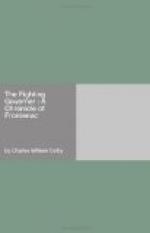It requires no flight of the imagination to appreciate the rage Frontenac must have felt when, on returning to Canada, he saw before his eyes the effects of La Barre’s rapacity and Denonville’s perfidy, of which the massacres of Lachine and La Chesnaye furnished the most ghastly proofs. But in these two cases the element of tragedy was so strong as to efface the mood of exasperation. There remained a third incident which must have provoked pure rage. This was the destruction of Fort Frontenac, blown up, at Denonville’s order, by the French themselves (October 1689). The erection and maintenance of this post had been a cardinal point in Frontenac’s Indian policy; and, more particularly to aggravate the offence, there was the humiliating fact that Denonville had ordered it demolished to comply with a demand from the Iroquois. This shameful concession had been made shortly before Frontenac reached Canada. It was Denonville’s last important act in the colony. On the chance that something might have occurred to delay execution of the order, Frontenac at once countermanded it and sent forward an expedition of three hundred men. But they were too late. His beloved fortress was gone. The only comfort which Frontenac could derive from the incident was that the work of destruction had been carried out imperfectly. There remained a portion of the works which could still be used.
Thus with regard to the Iroquois the situation was far worse in 1689 than it had been when Frontenac came to Canada in 1672. Everything which he had done to conciliate the Five Nations had been undone; and Dongan’s intelligent activities, coinciding with this long series of French mistakes, had helped to make matters worse. Nor was it now merely a question of the Iroquois. The whole Indian world had been convulsed by the renewal of strife between Onontio and the Five Nations. Tribes long friendly to the French and in constant trade with them were being alienated. The Indian problem as Frontenac saw it in 1690 resolved itself to this: either peace with the Iroquois on terms which would prove impressive to the Hurons, the Ottawas, and even to the savages of the Mississippi; or else uncompromising war. For under no circumstances could the French afford to lose their hold upon the tribes from whom they derived their furs.
Obviously an honourable peace would be preferable to the horrors of a forest war, and Frontenac did his best to secure it. To undo, as far as possible, Denonville’s treachery at Fort Frontenac and elsewhere, he had brought back with him to Quebec the Iroquois who had been sent to France—or such of them as were still alive. First among these was a Cayuga chief of great influence named Ourehaoue, whose friendship Frontenac assiduously cultivated and completely won. Towards the close of January 1690 an embassy of three released Iroquois carried to Onondaga a message from Ourehaoue that the real Onontio had returned and peace must be made with him




